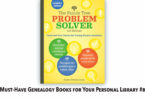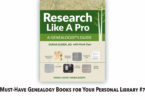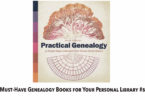If you are a beginning genealogist or a veteran of the game, there are certain books you just need to have around. These can be reference books, as well as educational books. Reference books can be ones you look at often to refresh yourself on things like how to cite a source or where to write to for certain records. Educational books teach you techniques to enhance your family tree that you might not have known before, and are also books you will turn to often to refresh yourself on their guidance.
The first must-have book you need on your personal genealogy library shelf is the latest edition of “Genealogy Standards“, by the Board for Certification of Genealogists. This book is periodically updated, and it’s always a good idea to have the latest version on your shelf. Though, even if you only ever have one version of it, this book will still be of benefit to you in your genealogy work, especially if you want to become a certified professional genealogist or have your work published in a genealogy publication.

The Board for Certification of Genealogists is concerned with making sure that all genealogy research is as accurate as it can possibly be. This is especially true of anyone seeking certification as a professional genealogist, but is also important for anyone who does genealogy, even if they are doing it only for themselves and/or their own family. There is always a certain degree of uncertainty of the accuracy of any historical information, unless you were personally there to witness and/or record it. This book teaches you what to use and look for to make sure there is the least amount of question of the accuracy of your genealogical research as possible.
The newest updated version includes information on how DNA results should be included in your genealogy research, especially as it pertains to living people. There are more living people being included in genealogy research today using DNA to build a family tree, so this guide for using it and making sure you are using it correctly is extremely important and helpful.
You will also find out such invaluable information as the difference between primary and secondary sources, the likelihood any of these sources are accurate, and how even the most seemingly iron-clad documents can have errors or even personal bias in them, depending on who produced them, when, and what personal agenda that person had in putting a certain record together.
This book of standards will guide you in your research to point you toward the records and resources most likely to be accurate, and will teach you to evaluate each record you use in your research for its true measure of accuracy. It will also teach you how to properly compare the various sources you use to ensure accuracy of any given fact, and the importance of using more than one source for each fact on your family tree. The more sources, the greater chance of accuracy in your work.




